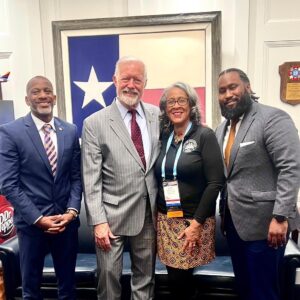
Keith Henry, Director of Public Policy, Family Service Center of Galveston County; Randy Weber, United States Representative, Texas’ 14th District; Sharon Lewis, District 1 Council Member, Galveston City Council; Dr. Jared Williams, Executive Director, Family Service Center of Galveston County
In addition to supporting our grantee partners’ community programs, the Hogg Foundation also encourages their efforts to build capacity in state and local policy engagement. Recently, Hogg grantee partner Family Service Center of Galveston County (FSC) has been making strides in this arena.
In episode 147, we speak with FSC’s executive director, Dr. Jared Williams, and public policy director Keith Henry to learn more about the organization’s policy priorities and its growing voice in policy engagement.
A Shared Vision
In their work to further the Family Service Center of Galveston County’s (FSC) mission of promoting the mental health and well-being of individuals and families through counseling, education, and prevention, Dr. Jared Williams and Keith Henry share a vision for policy engagement.
After working in the nonprofit healthcare field for over ten years, including at Federally Qualified Health Centers (FQHC), Jared came to FSC with operational expertise and a clear understanding of the clinical experience and clinicians’ needs.
“I see myself bridging the gap between the clinicians and the executive levels,” he says. “And from being involved in the FQHC space, I’m also used to doing a lot of advocacy work, which is why Keith and I connected and related so easily.”
As a former elected official, Keith brings experience building relationships with lawmakers that helps FSC to gain access to people and places that are difficult to approach.
“I can also look at the language of proposed bills, ordinances, and so on and ‘interpret’ the language,” he says. “My background as a public servant helps me understand the motivations behind the proposals.”
Learning From Each Other
With complementary skill sets, Jared and Keith are also learning from each other in their work to strengthen FSC’s ability to advocate.
“I’ve learned everything from Keith when it comes to public policy. He has really done a great job forecasting and positioning our organization to be at the forefront of mental health policy at local, state, and federal levels,” says Jared. “I’ve also learned that not everything is as ‘cookie-cutter’ as it may seem. You need an extensive knowledge base to understand the changeable aspects of policy and where policy is headed.”
Likewise, Keith is broadening his understanding of the needs of mental health clinicians and consumers.
“I’m learning what clinicians and mental health practitioners really need so I can understand what policies would best serve them,” he says. “It’s always an ongoing dialogue on how best to serve the needs of the community and the organization.”
Local, State, and National Engagement
“We really run the gamut in terms of public policy, working at the local, state, and national levels,” says Keith.
At the local level, FSC participates in policy proposals related to school-based mental health services and community policing approaches to mental health crises.
Their state level engagement includes meeting with legislators to advocate for proposed mental health legislation, giving written testimony in support of expanding funding for child and family mental health services, and participating in Galveston County Day to meet with legislators about local projects that need state support.
“Galveston County Day gave us an opportunity not only to go to the Capitol with colleagues from our community, but also to form a team from FSC who could approach representatives with a really detailed presentation on who we are, what we do, what our priorities are, and what we would like for them to support,” says Jared. “Keith enabled us to get a lot of one-to-one time with individual legislators. Whether they supported our priorities or not, they were able to ask a lot of intelligent questions that needed to be answered from a mental health standpoint.”
Strengthening relationships with legislators also positively affects FSC’s work with The Future is Us (TFIU), a Hogg Foundation Communities of Care grantee partner that addresses the social determinants of mental health in Galveston that impact the disproportionate representation of Black children in exclusionary discipline settings in Galveston Independent School District.
Jared meets with TFIU members to give policy updates, answer questions, and listen to members’ perspectives on policy.
“They’ve seen the effects of our policy work,” he says. “We’re not advocating for just FSC. We’re advocating for everyone in the community.”
Finally, at a federal level, Jared and Keith recently met with U.S. Representative Lloyd Doggett to discuss the potential implications of the Bipartisan Safer Communities Act for Galveston area communities.
Moving Forward
“Even after establishing rapport with elected officials, policy work is really slow moving,” says Keith. “Bills have to go through committees, calendars, and both the Senate and the House of Representatives. There’s a lot of give and take. It’s just not going to happen overnight.”
Despite these challenges, Keith and Jared are committed to making a long-term investment in policy engagement on behalf of FSC specifically and accessible mental health services in general.
“We have opportunities for our voices to be heard,” says Jared. “It’s important that we get out there and we exercise our voice and let our elected officials know what the priorities are in our communities.”
May is Mental Health Awareness Month. Throughout the month, we celebrate stories of recovery, strides in mental health policy, and the many things our grantee partners are doing to transform mental health in their communities. Don’t miss out!
Related Links
- Into the Fold, Episode 146: Some Good News in Public Policy
- Into the Fold, Episode 141: Texas Legislature Preview:2023
- Mental Health Guide: A Guide to Understanding Mental Health Systems and Services in Texas
- A Vision for the Future: Policy Priorities, 2023-2024
